Balancing the Ban
Mixed reaction to talks of reviewing the ban on LTTE organizations:
Under UN Security Council Resolution 1373, Sri Lanka proscribed 15
LTTE fronts with effect from April 1, 2014. The order enabled funds,
assets, economic resources belonging to or owned by the designated
persons and entities to remain frozen.
The diaspora groups have since been up in arms against the decision.
While some welcomed the action as a crucial move to suppress LTTE
revival tactics, others pointed out it was too harsh a move that certain
faultless diaspora members were also penalised as a result.
Taking a cue, Foreign Minister Mangala Samaraweera recently in
Parliament expressed the need to review the list of 16 organisations and
424 individuals banned by the previous government.
In this backdrop the Sunday Observer spoke to a cross-section of key
personalities on the topic.
by Manjula Fernando
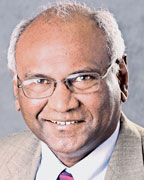 |
| Prof. S.
Ratnajeevan H. Hoole |
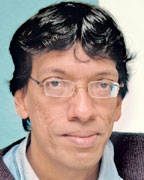 |
| Jehan Perera |
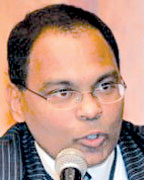 |
| Rohan
Gunaratna |
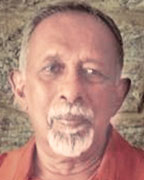 |
| Dr. John
Gooneratne |
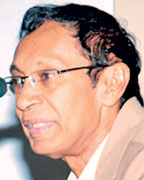 |
| Gomin Dayasri |
Prof. S. Ratnajeevan H. Hoole
College of Engineering of the Michigan State University - appointed
Jaffna University Vice Chancellor by President Rajapaksa in 2006 but
fled the country due to LTTE threats
“A review is certainly welcome - remember, it is only a review and
many of the names are so badly formed as to make ordinary innocent
people be mistaken for those on the list. Others on the list were active
in the separatist cause at a time when the government of Sri Lanka too
tended to murder and mayhem. Discussions with some on the list such as
Viswanathan Rudrakumar are necessary for any reconciliation to be
serious. Many are Tamil Diaspora show-offs who are given status by being
put on the list.
Ridiculous it is to say that associating with The Rev. Fr. Joseph
Francis Xavier a.k.a Kutti Xavier of the gazette is unlawful. He
functions as an Anglican priest and anyone taking communion from him
would be rendered a criminal by this ban. The review is the right
thing.”
Jehan Perera
Executive Director, National Peace Council
“The Tamil Diaspora is generally portrayed in Sri Lanka as being
hostile to the country and seeking its division. During the war, funding
and weaponry came to the LTTE from abroad which contributed to their
becoming a formidable military force and a threat to the unity of the
country and to the lives of its citizens. When the LTTE’s defeat became
imminent the Tamil Diaspora actions in mobilizing in huge protests in
the Western countries against the Sri Lankan government in the final
stage of the war showed that they could take on the LTTE’s cause to
themselves.
However, after the presidential election that saw the unseating of
President Mahinda Rajapaksa there are increasingly close ties between
the new government and the TNA, which represents the mainstream Tamil
polity within the country. This is causing a change in the Tamil
Diaspora in a manner that bodes well for national reconciliation.
In a recent statement the head of the Global Tamil Forum Fr SJ
Emmanuel has said that ‘The blame for the present situation of the
country or of the Tamils cannot be placed only on the Sinhalese people
and their leaders alone. As I explained above, we have inherited a
system of government initiated by leaders from all communities.
Unfortunately it has brought us all to this plight. The present regime
change is a unique chance to examine our foundations and do all that is
possible for a better future.’ Both the Global Tamil Forum and Fr
Emmanuel are banned under the terrorist proscription. The time to review
the ban has come.”
Rohan Gunaratna
Professor of Security Studies and Head of International Centre for
Political Violence and Terrorism Research, Singapore
“The LTTE sustained a brutal terrorist campaign for 30 years because
of the external support it mobilized from overseas. Through front, cover
and sympathetic organizations, the LTTE raised millions of dollars and
purchased armaments to kill, maim and injure tens of thousands of Sri
Lankans.
If the LTTE entities are deproscribed, the LTTE remnants attempting
to revive will regroup and terrorism will re-emerge. The LTTE has not
abandoned their separatist ideology.
If the aim of President, Prime Minister Ranil Wickremasinghe,
Minister of State for Defence Ruwan Wijewardene is to maintain country's
stability, they should not release the hardcore detainees and inmates
and deproscribe the LTTE entities overseas.
The very first external LTTE support-base was established in Tamil
Nadu, then London and thereafter Toronto. Due to electoral compulsions,
the Indian, British and Canadian governments did not act decisively
against the LTTE until the outfit killed Rajiv Gandhi and its criminal
and terrorist support activity affected British and Canadian soil.
When the LTTE attempted to revive overseas after it was dismantled in
Sri Lanka in May of 2009, the Government of Sri Lanka designated a list
of entities and persons that had supported terrorism in the past.
The designated persons and entities were identified by reviewing
documents recovered from LTTE archives, from the battlefield and foreign
intelligence. Having acted as LTTE facilitators, propagandists,
recruiters, fund-raisers, procurement officers and shipping managers,
the designated persons are faking as human rights activists. Today, they
are prohibited from moving, transferring or dealing with frozen assets.
The seriousness of the order was conveyed to nations where these foreign
terrorist organisations and persons are now domiciled.
The banned Foreign Terrorist Organizations are led by following four
key individuals, Perinbanayagam Sivaparan alias “Nediyavan”, Rev.Fr. SJ
Emmanuel, Visuvanathan Ruthirakumaran and Sekarampillai Vinayakamoorthy
alias Vinayagam.
In 2015, the LTTE entities lobbied vulnerable politicians in the new
government to deproscribe the LTTE fronts overseas. Instead of seeking
to deproscribe, the Sri Lankan government should investigate, charge and
prosecute the entities who supported the campaign of terrorism in Sri
Lanka. This should include not only LTTE directing figures overseas but
their associates in Sri Lanka. Sri Lanka and Sri Lankans paid a heavy
price for compromising security in the past. Politicians have ruined Sri
Lanka for their personal and narrow political gains since Sinhala Only
Act of 1956 and the civil servants and public must not allow them to do
it again.
Without security, there cannot be economic development, social
progress and political stability. No government should play with
security, especially because the LTTE is very much an active
organization overseas."
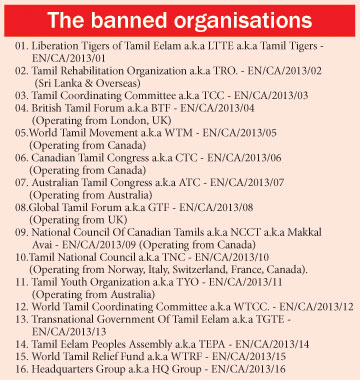 Dr. John Gooneratne Dr. John Gooneratne
Retired Foreign Service Ambassador, served in the Government Peace
Secretariat (SCOPP) from 2002-2006 and the Lessons Learned and
Reconciliation Commission (LLRC) in 2011:
President Sirisena visited the UK this March, with great confidence,
as the recently-elected common candidate, with support from all
communities, the Sinhalese, Tamils and Muslims. Though he was open to
meeting with Tamil Diaspora groups, none materialized, though some of
them did not participate in some of the demonstrations organised, in
view of the improving mood of communal harmony in Sri Lanka.In November
2010, former President Mahinda Rajapaksa, scheduled to address the
Oxford Union, had to cancel his visit, after Tamil activists in the UK
threatened to seek a warrant for his arrest for alleged human rights
abuses committed during the war. There is a very different approach to
national unity on the part of the two Presidents.
In March 2014 the Sri Lankan Government listed 424 individuals and
sixteen organizations as having LTTE terrorist connections, under the
particular UN Security Council resolutions.
The 16 organisations were Tamil groups in different countries in the
West. And the 424 individuals were mostly office bearers and members in
those organisations, And of the 424 individuals 34 had Interpol Red
Notices served on them. This listing caused enormous problems to the
Tamils living overseas. None on the list could visit Sri Lanka, for fear
of being arrested. And there
were no reasons given for their being on the list. There was no
evidence that they were LTTE-connected, or involved in terrorist
activities against Sri Lanka. The listing seemed to be more an
anti-Tamil Diaspora political exercise by the previous government.
Tamil groups in the UK lobbied some of the high officials that
President Sirisena was due to meet, to explain the enormous difficulties
caused by the listing to a lot of diaspora Tamils, who were not security
threats to Sri Lanka, and were only wanting to visit home and family.
If the listing is designed as a security measure, a big problem the
Sri Lanka security people will face is the fact that the organizations
that are listed are legal organisations in those countries, and the
office bearers are indulging in regular citizen activity. And as the 34
Interpol Red Notices in the listing indicated there are routes other
than the listing of names to prevent security threats to the state, and
which Sri Lanka is already pursuing.
Under the circumstances what is needed is the repeal of the listing
as it is presently constructed, and not just tinkering with it, and
defining in a better way what the security threats to the state are,
whether from Sinhalese, Tamils or Muslims, and designing measures to
counter them. The present listing presumes the only threat to the
country is from the Tamils.
This is not the Sirisena-philosophy, as we understand it.”
Gomin Dayasri
Legal luminary, represented Government delegation at the 2005 peace
negotiations with the LTTE in Geneva
"The Minister for Foreign Affairs has presented in Parliament
provisions widening the coverage of freezing orders, expanding
provisions in handling foreign requests, in reporting attempted
transactions and redressing persons who are inadvertently affected.
It is indeed necessary to update regulations relating to terrorism,
as it is a flexible subject with terrorism being a sad but a successful
vehicle in overcoming conventional forces and nation states. Terrorists
are becoming sophisticated in their varied techniques.
The need for international cooperation is prime but words coming from
the present Minister of Foreign Affairs leads to an element of suspicion
as there is a perception that he is soft on the Tigers and bows too much
to the international pressures.
To dispel any suspicion it is best if he can coordinate with the last
regime that was very successful in their efforts against terrorism and
make the war an undisputed subject across the political divide probably
excluding the TNA, as their loyalties are known. This must be attended
on a one to one unofficial basis. We have been more successful in
eliminating terrorism than the international community. Therefore to
understand our needs our local talent should be tapped and utilized to
the maximum. The international community alone should not guide us. They
led us stray previously.
The Minister on his recent pronouncements is hoping to build bridges
to the Diaspora; is a matter of concern as much of them are habitually
anti Sri Lankan, living abroad and trying to exploit the host country to
their advantage by their personal antics. We must first build bridges to
the innocent Tamil people of the north. They, unlike the Diaspora, love
the land on which they live.
Problem is the TNA; they like to spread seeds of hate among the
Tamils against the Sinhalese and gain political mileage. It is TNA that
is sacrificing the goodwill shown by Tamil people. We must lay our faith
in the People of the North."
*************
[ The banned organisations]
01. Liberation Tigers of Tamil Eelam a.k.a LTTE a.k.a Tamil Tigers -
EN/CA/2013/01
02.Tamil Rehabilitation Organization a.k.a TRO. - EN/CA/2013/02 (Sri
Lanka & Overseas)
03.Tamil Coordinating Committee a.k.a TCC - EN/CA/2013/03
04. British Tamil Forum a.k.a BTF - EN/CA/2013/04 (Operating from
London, UK)
05.World Tamil Movement a.k.a WTM - EN/CA/2013/05 (Operating from
Canada)
06. Canadian Tamil Congress a.k.a CTC - EN/CA/2013/06 (Operating from
Canada)
07. Australian Tamil Congress a.k.a ATC - EN/CA/2013/07 (Operating from
Australia)
08.Global Tamil Forum a.k.a GTF - EN/CA/2013/08 (Operating from UK)
09. National Council Of Canadian Tamils a.k.a NCCT a.k.a Makkal Avai -
EN/CA/2013/09 (Operating from Canada)
10.Tamil National Council a.k.a TNC - EN/CA/2013/10 (Operating from
Norway, Italy, Switzerland, France, Canada).
11. Tamil Youth Organization a.k.a TYO - EN/CA/2013/11 (Operating from
Australia)
12. World Tamil Coordinating Committee a.k.a WTCC. - EN/CA/2013/12
13. Transnational Government Of Tamil Eelam a.k.a TGTE - EN/CA/2013/13
14. Tamil Eelam Peoples Assembly a.k.a TEPA - EN/CA/2013/14
15. World Tamil Relief Fund a.k.a WTRF - EN/CA/2013/15
16. Headquarters Group a.k.a HQ Group - EN/CA/2013/16
************* |

